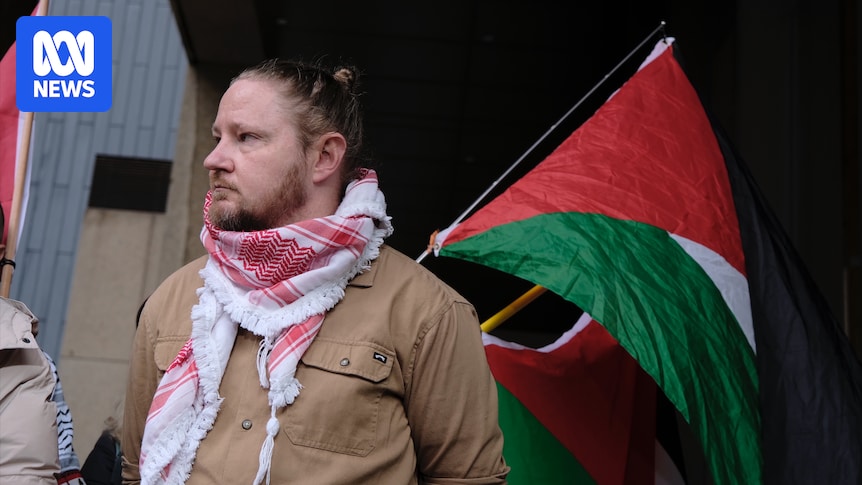The NSW Supreme Court has ruled amendments to protest laws that centred around places of worship are invalid.
Josh Lees, an organiser from the Palestine Action Group, challenged the validity of the laws that were introduced in February, as part of a suite of changes intended to crack down on hate speech amid a series of antisemitic incidents in Sydney.
But lawyers for Mr Lees argued the changes stretched police powers beyond legitimate bounds.
They said police were empowered to direct protesters to move on or desist if they were near a place of worship, even if there was no basis to believe worshippers felt obstructed, harassed or fearful.
Mr Lees and Greens upper house MP Sue Higginson outside of court. (ABC News: Jamie McKinnell)
Justice Anna Mitchelmore on Thursday made a declaration that the amendments “impermissibly burdens the implied constitutional freedom of communication on government or political matters”.
Right to protest upheld in NSW
Mr Lees said the court loss represented a failure for Premier Chris Minns.
“Now he has massive egg on his face, these laws have been ruled out,” he told the media outside court.
“Thankfully, at least in this matter, we’ve been able to uphold the right of the people of New South Wales to protest.”
He accused the premier of being hostile to the pro-Palestinian cause.
“Today is a win for the Palestine movement and not just for the Palestine movement, but for everyone who ever might want to protest for anything in this state.”
The ABC has requested comment from Mr Minns.
The protesters argued the law imposed a “direct, substantial and discriminatory burden” on the implied freedom.
But in defending the case, lawyers for the state argued the amendments operated in a more confined manner than what the activists contended, and that any burden was slight.
Those competing views on the operation and effect of the amendments were central to the court case.
‘Locational overlap’ centre of court ruling
The judge was told that organisers of protests seek to hold events in places that are busy and visible, including the CBD, Town Hall Square, Hyde Park North, Martin Place, Belmore Park and Queens Square.
In her judgement, Justice Mitchelmore said the evidence demonstrated a “locational overlap between places where people commonly seek to protest and places of worship”.
The wording of the amendment — in particular, the phrase “in or near a place of worship” — was a focus of the competing submissions.
The activists argued that was a “a geographically loose phrase that is readily capable of satisfaction”.
But the state’s legal team said the phrase was more narrowly confined when considered with other parts of the law that enliven police powers, which meant any burden on the implied freedom was “significantly diminished”.
“Protests and procession routes in areas of civic significance will likely place protesters in close physical proximity to places of worship,” Justice Mitchelmore said.
The “marginal burden” imposed by the amendment “goes further than the constitutionally valid baseline in a meaningful way”, she said.

